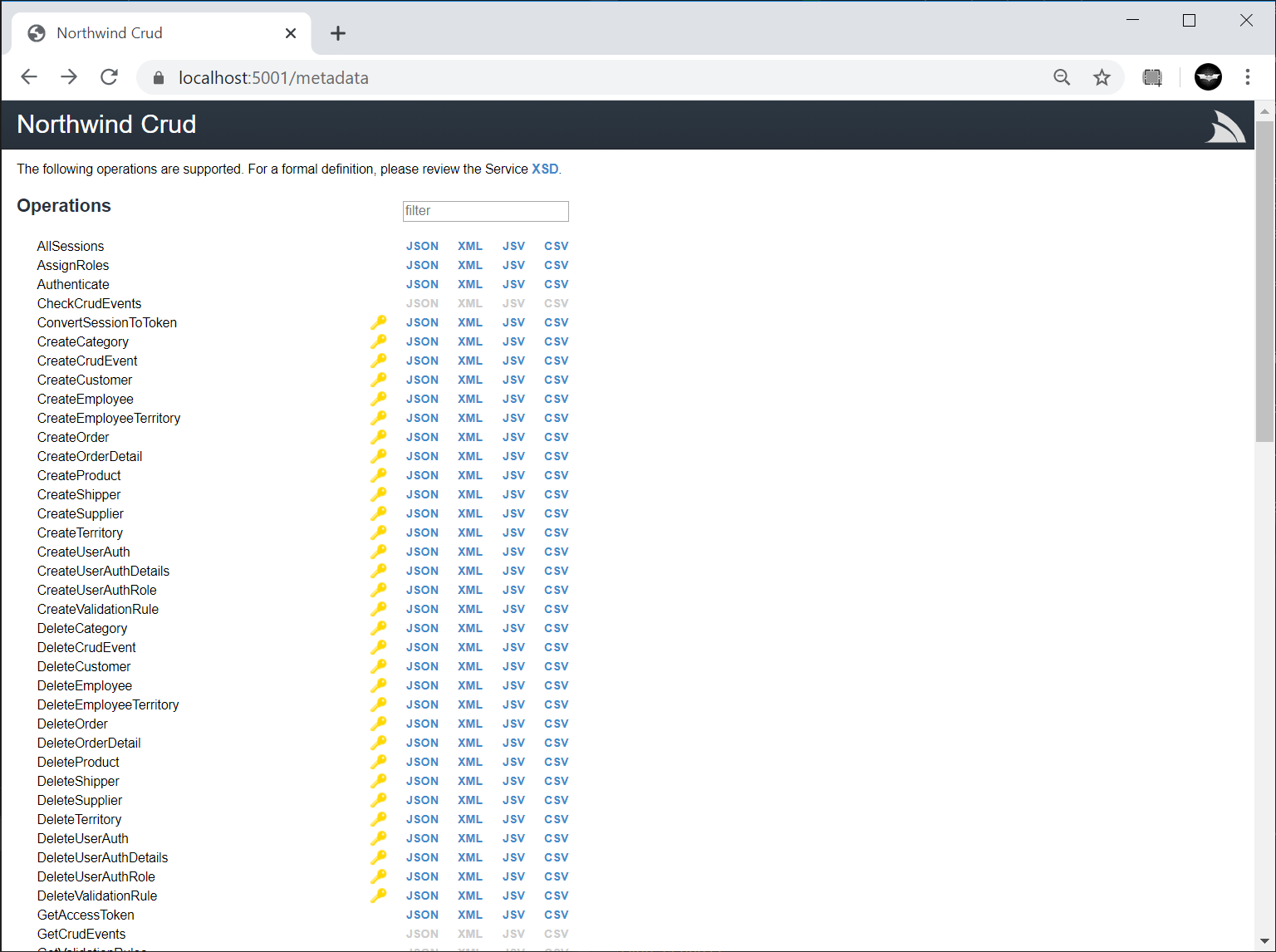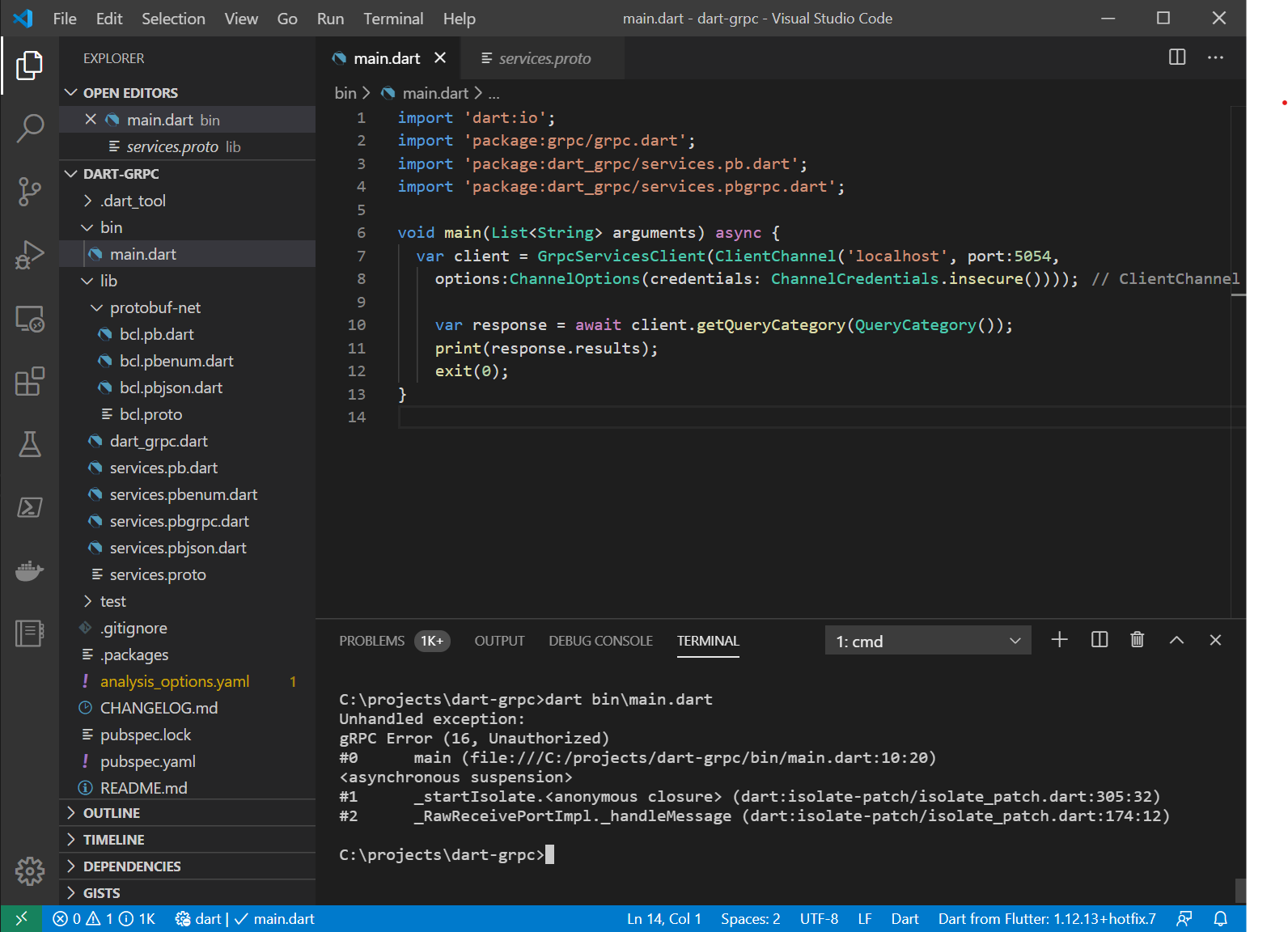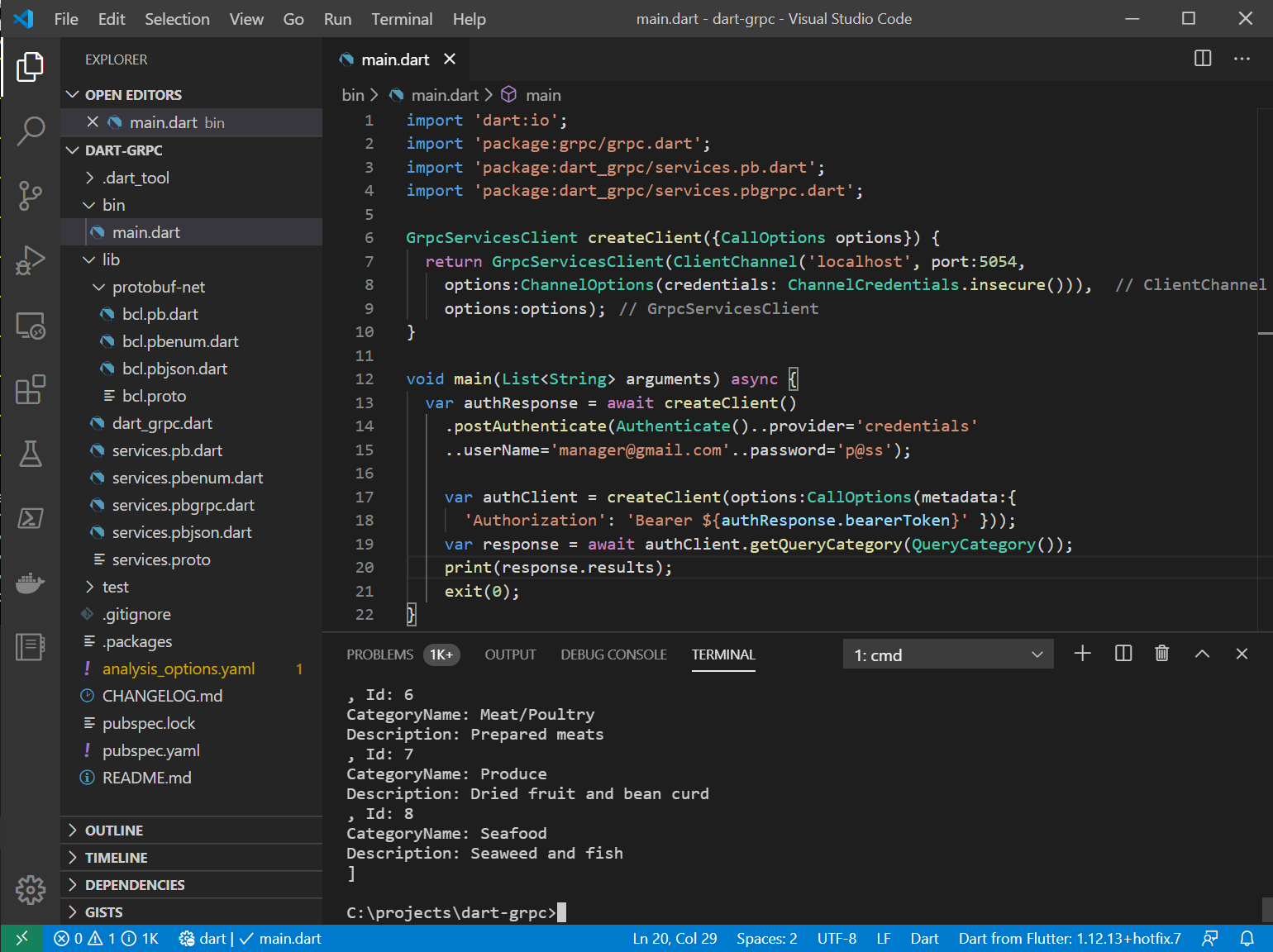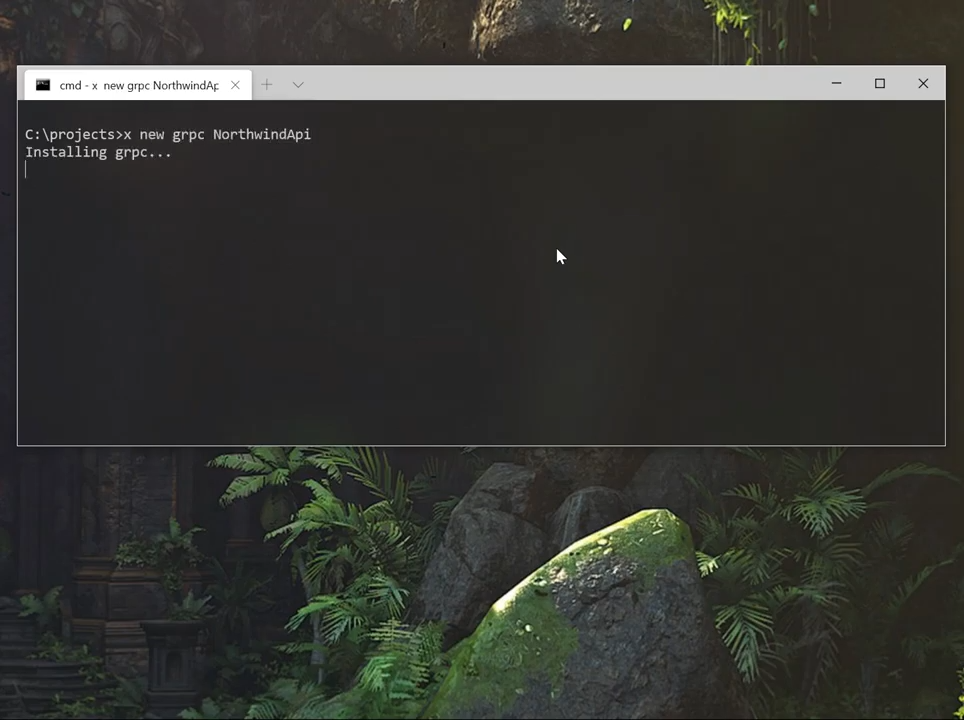Long time users of ServiceStack will know it's a staunch proponent of code-first development where your C# Types retains the master authority of your App's logic, although there are a number of times where you have to work with existing databases which would require significant effort to create the initial code-first Data Models.
AutoGen vs TypeScript Data Models
This AutoGen-based approach uses runtime C# reflection to inspect your RDBMS schema at startup and dynamically register AutoQuery CRUD Services for your existing tables. By contrast, the okai TypeScript Data Models approach first exports DB metadata and converts it into TypeScript Data Models, then generates the AutoQuery CRUD APIs, RDBMS Data Models and DB migrations from those definitions.
Code Generation of AutoQuery & CRUD Services
Now with AutoCrud we can add a lot more value in this area as AutoCrud's declarative nature allows us to easily generate AutoQuery & Crud Services by just emitting declarative Request DTOs.
You can then add the generated DTOs to your ServiceModel's to quickly enable AutoQuery Services for your existing databases.

To enable this feature you you just need to initialize GenerateCrudServices in your AutoQueryFeature plugin, e.g:
services.AddPlugin(new AutoQueryFeature {
MaxLimit = 1000,
GenerateCrudServices = new GenerateCrudServices {}
});
If you don't have an existing database, you can quickly test this out with a Northwind SQLite database available from https://github.com/NetCoreApps/NorthwindAuto:
x download NetCoreApps/NorthwindAuto
As you'll need to use 2 terminal windows, I'd recommend opening the project with VS Code which has great multi-terminal support:
code NorthwindAuto
Register DB Connection
The important parts of this project is the registering the OrmLite DB Connection, the above configuration and the local northwind.sqlite database, i.e:
container.AddSingleton<IDbConnectionFactory>(c =>
new OrmLiteConnectionFactory(MapProjectPath("~/northwind.sqlite"), SqliteDialect.Provider));
When using Endpoint Routing the DB Factory also needs to be initialized on GenerateCrudServices, the easiest way to do that would be to register AutoQueryFeature plugin in Configure.Db.cs e.g:
public class ConfigureDb : IHostingStartup
{
public void Configure(IWebHostBuilder builder) => builder
.ConfigureServices((context, services) => {
var ormLite = services.AddOrmLite(options => options.UseSqlite(connString));
services.AddPlugin(new AutoQueryFeature {
MaxLimit = 1000,
GenerateCrudServices = new GenerateCrudServices {
DbFactory = ormLite.DbFactory,
}
});
// ...
});
}
Export Code-First DTOs
After restarting your App with AutoGen's GenerateCrudServices enabled you can export the auto-generated APIs and Data Models into code-first C# classes
Generating AutoQuery APIs and Data Models
The development experience is essentially the same as Add ServiceStack Reference where you'll need to run the .NET Core App in 1 terminal:
dotnet run
Then use the x dotnet tool to download all the AutoQuery & Crud Services for all tables in the configured DB connection:
x csharp https://localhost:5001 -path /crud/all/csharp
If you're running a mix of autogenerated AutoGen AutoQuery APIs with existing typed AutoQuery APIs, you can just generate the new Services with:
x csharp https://localhost:5001 -path /crud/new/csharp
Which you can then copy into your ServiceModel project.
TIP
If no schema is provided, a default schema is used which depends on the Dialect Provider, eg SQL Server, PostgreSQL etc. Multiple schema support requires the AutoQueryFeature to be configured with multiple schemas.
Updating Generated Services
If your RDBMS schema changes you'd need to restart your .NET App, then you can update all existing dtos.cs with:
x csharp
i.e. the same experience as updating normal DTOs.
Switch to code-first dev model
After generating dtos.cs AutoGen is no longer needed and can now be removed by removing GenerateCrudServices
services.AddPlugin(new AutoQueryFeature {
MaxLimit = 1000,
// GenerateCrudServices = new GenerateCrudServices {}
});
All functionality and features can now be added to annotating & enhancing your code-first C# Typed DTOs.
AutoGen specific options in AutoGen DTOs
When using AutoGen to generate Typed AutoQuery DTOs for your RDBMS Tables:
x csharp https://localhost:5001 -path /crud/all/csharp
The generated dtos.cs includes AutoGen-specific options that can be used to maintain multiple custom RDBMS Tables and AutoQuery APIs, e.g. you could maintain one for each of your different RDBMS schemas:
/* Options:
//...
//IncludeCrudOperations:
Schema: custom
//NamedConnection:
//NoCache:
//IncludeTables:
//ExcludeTables:
//AuthSecret:
*/
AutoGen Code Generation Customizations
AutoGen also supports a number of options to customize its generated code:
- IncludeCrudOperations
string[]- Which AutoCrud APIs to include:Query,Create,Update,Patch,Delete - Schema
string- The RDBMS Schema you want AutoQuery Services generated for - NamedConnection
string- The NamedConnection you want AutoQuery Services generated for - NoCache
boolean- Do not use cached DB Table Schemas, re-fetch latest - IncludeTables
string[]- Allow List to specify only the tables you would like to have code-generated - ExcludeTables
string[]- Block List to exclude tables from code-generation - AuthSecret
string- The Admin AuthSecret to access Service in Release mode
For example you can use an empty array to only generate Data Models without any AutoQuery APIs:
x csharp https://localhost:5001 -path /crud/all/csharp -q IncludeCrudOperations=[]
Only generate read-only APIs by limiting generation to Query AutoQuery Request DTOs:
x csharp https://localhost:5001 -path /crud/all/csharp -q IncludeCrudOperations=[Query]
Only generate Read, Create and Update APIs (i.e. no Delete):
x csharp https://localhost:5001 -path /crud/all/csharp -q IncludeCrudOperations=[Query,Create,Patch]
These customized generated classes are also available from your App's built-in endpoints:
| Type | URL |
|---|---|
| All Services (C#) | https://localhost:5001/crud/all/csharp |
| Only New Services (C#) | https://localhost:5001/crud/new/csharp |
| Read Only Services (C#) | https://localhost:5001/crud/all/csharp?IncludeCrudOperations=[Query] |
| Only Data Models (C#) | https://localhost:5001/crud/all/csharp?IncludeCrudOperations=[] |
| New Auto Generated Services (C#) | https://localhost:5001/crud/new/csharp |
| Generate DTOs in alt languages (e.g. TypeScript) | https://localhost:5001/crud/all/typescript |
AutoRegister AutoGen AutoQuery Services
To recap we've now got an integrated scaffolding solution where we can quickly generate code-first AutoQuery Services and integrate them into our App to quickly build an AutoQuery Service layer around our existing database.
But we can raise the productivity level even higher by instead of manually importing the code-generated Services into our project we just tell ServiceStack to do it for us.
This is what the magical AutoRegister flag does for us:
var ormLite = services.AddOrmLite(options => options.UseSqlite(connString));
services.AddPlugin(new AutoQueryFeature {
GenerateCrudServices = new GenerateCrudServices {
DbFactory = ormLite.DbFactory,
AutoRegister = true,
//....
}
});
Instantly Servicify Northwind DB with gRPC
To show the exciting potential of this feature we'll demonstrate one valuable use-case of creating a grpc project, mixing in AutoQuery configuration to instantly Servicifying the Northwind DB, browsing the generated Services from ServiceStack's Metadata Page, explore the gRPC RPC Services .proto then create a new Dart App to consume the gRPC Services:
YouTube: youtu.be/5NNCaWMviXU
Step-by-step Guide
See the annotated guide below to follow along:
Create a new grpc .NET Core project and open it in VS Code:
npx create-net grpc NorthwindApi
code NorthwindApi
Inside VS Code open a Terminal Window and mix in the required configuration:
cd NorthwindApi
npx add-in autocrudgen sqlite northwind.sqlite
Which will mix in the autocrudgen gist to enable AutoQuery and tell it to Auto Generate AutoQuery and CRUD Services for all tables in the registered RDBMS (default schema):
public class ConfigureDb : IHostingStartup
{
public void Configure(IWebHostBuilder builder)
{
builder.ConfigureServices((context,services) =>
{
var ormLite = services.AddOrmLite(options => options.UseSqlite(connString));
services.AddPlugin(new AutoQueryFeature {
MaxLimit = 1000,
GenerateCrudServices = new GenerateCrudServices {
DbFactory = ormLite.DbFactory,
AutoRegister = true
}
});
});
}
}
The sqlite gist registers an OrmLite.Sqlite RDBMS connection with our App which we want to configure to connect to a northwind.sqlite database:
public void Configure(IServiceCollection services)
{
services.AddSingleton<IDbConnectionFactory>(new OrmLiteConnectionFactory(
Configuration.GetConnectionString("DefaultConnection"),
SqliteDialect.Provider));
}
Then we apply the northwind.sqlite gist to add the northwind.sqlite database to our new project.
Now that our App's configured we can run it with:
dotnet run
Where it will start the ServiceStack gRPC App on 3 ports configured in appsettings.json:
5001- Enables access from existing HTTP/1.1 clients and proxies5002- Enables a secure gRPC Channel5003- Enables an insecure gRPC Channel
{
"Kestrel": {
"Endpoints": {
"Https": {
"Url": "https://*:5001",
"Protocols": "Http1"
},
"GrpcSecure": {
"Url": "https://*:5051",
"Protocols": "Http2"
},
"GrpcInsecure" : {
"Url": "http://*:5054",
"Protocols": "Http2"
}
}
}
}
Once running you can view your Apps metadata page at https://localhost:5001 to inspect all the Services that were generated.
Create Dart gRPC Console App
It's also now accessible via ServiceStack's gRPC endpoint which opens your generated Services up to Google's high-performance gRPC ecosystem which enables typed, high-performance integrations into exciting platforms like Flutter which uses the Dart programming language to create Reactive, high-performance native Android and iOS Apps.
We can test Dart's gRPC integration and development workflow in a new Dart Console App we can create with:
mkdir dart-grpc && cd dart-grpc
pub global activate stagehand
stagehand console-full
We'll need to update pubspec.yaml with the required gRPC dependencies:
dependencies:
fixnum: ^0.10.11
async: ^2.2.0
protobuf: ^1.0.1
grpc: ^2.1.3
When you save pubspec.yaml Dart's VS Code extension will automatically fetch any new dependencies which can also be manually run with:
pub get
We can then use the protoc support in the dotnet tools to download our .proto Services descriptor and generate Dart's gRPC classes with a single command:
x proto-dart https://localhost:5001 -out lib
We're now all set to consume our gRPC Services using the protoc generated gRPC proxy in our main() function in main.dart:
import 'dart:io';
import 'package:grpc/grpc.dart';
import 'package:dart_grpc/services.pb.dart';
import 'package:dart_grpc/services.pbgrpc.dart';
void main(List<String> arguments) async {
var client = GrpcServicesClient(ClientChannel('localhost', port:5054,
options:ChannelOptions(credentials: ChannelCredentials.insecure())));
var response = await client.getQueryCategory(QueryCategory());
print(response.results);
exit(0);
}
Which can be run with:
dart bin\main.dart
Calling gRPC SSL Services
The Dart gRPC Docs shows how we can connect to it via our gRPC SSL endpoint by running the openssl scripts in grpc/scripts to generate our dev.crt and prod.crt SSL Certificates that you can configure in your in your GrpcSecure endpoint with:
{
"Kestrel": {
"Endpoints": {
"GrpcSecure": {
"Url": "https://*:5051",
"Protocols": "Http2",
"Certificate": {
"Path": "dev.pfx",
"Password": "grpc"
}
}
}
}
}
Where you'll then be able to access the secure gRPC SSL endpoints using the generated dev.crt certificate in your Dart App:
import 'dart:io';
import 'package:grpc/grpc.dart';
import 'package:dart_grpc/services.pb.dart';
import 'package:dart_grpc/services.pbgrpc.dart';
GrpcServicesClient createClient({CallOptions options}) {
return GrpcServicesClient(ClientChannel('localhost', port:5051,
options:ChannelOptions(credentials: ChannelCredentials.secure(
certificates: File('dev.crt').readAsBytesSync(),
authority: 'localhost'))), options:options);
}
void main(List<String> args) async {
var client = createClient();
var response = await client.getQueryCategory(QueryCategory());
print(response.results);
exit(0);
}
AutoGen's AutoRegister Implementation
Whilst the AutoRegister = true flag on its face may seem magical, it's simply an instruction that tells ServiceStack to register the new AutoQuery Services it already knows about and register them as if they were normal code-first Services that we had written ourselves.
More accurately, behind-the-scenes it uses the Metadata Type structure it constructed in generating the Services & Types, i.e. the same Types used to project into its Add ServiceStack Reference's generated C#, TypeScript, (and other languages) which are also the same Types that are manipulated when customizing code-generation, gets used to generate .NET Types in memory on Startup with Reflection.Emit.
Barring any issues with the projection into IL, externally the end result is indistinguishable to a normal code-first ServiceStack Service manually created by a developer - An important point as to why these solutions compose well with the rest of ServiceStack, just as an AutoQuery Service is a normal ServiceStack Service, these auto generated & auto registered ServiceStack Services are regular Auto Query Services.
The primary difference is that they only exist in a .NET Assembly in memory created on Startup, not in code so they're not "statically visible" to a C# compiler, IDE, tools, etc. But otherwise they're regular typed ServiceStack Services and can take advantage of the ecosystem around Services including Add ServiceStack Reference & other Metadata Pages and Services, etc.
CreateCrudServices Instructions
Peeking deeper behind the AutoRegister flag will reveal that it's a helper for adding an empty CreateCrudServices instance, i.e. it's equivalent to:
var ormLite = services.AddOrmLite(options => options.UseSqlite(connString));
services.AddPlugin(new AutoQueryFeature {
GenerateCrudServices = new GenerateCrudServices {
DbFactory = ormLite.DbFactory,
CreateServices = {
new CreateCrudServices()
}
//....
}
});
Multiple Schemas and RDBMS Connections
This instructs ServiceStack to generate Services for the default option, i.e. all tables in the Database of the default registered Database connection and default schema.
Although should you wish to, you can also generate Services for multiple Databases and RDBMS Schemas within the same App.
With this you could have a single API Gateway Servicifying access to multiple System RDBMS Tables & Schemas, e.g:
var ormLite = services.AddOrmLite(options => options.UseSqlite(connString));
services.AddPlugin(new AutoQueryFeature {
GenerateCrudServices = new GenerateCrudServices {
DbFactory = ormlite.DbFactory,
CreateServices = {
new CreateCrudServices(),
new CreateCrudServices { Schema = "AltSchema" },
new CreateCrudServices { NamedConnection = "Reporting" },
new CreateCrudServices { NamedConnection = "Reporting", Schema = "AltSchema" },
}
//....
}
});
These will generated Service Contracts & DTO Types with the Multitenancy NamedConnection & OrmLite [Schema] attribute required for routing AutoQuery Services to use the appropriate RDBMS connection of Schema.
Although there are potential conflicts if there are identical table names in each RDBMS/Schema as it has to go back and rewrite the Metadata References to use a non-ambiguous name, first tries using the NamedConnection, then the schema then a combination when both exists, if it's still ambiguous it gives up and ignores it. If you do run into conflicts, the recommendation is to "eject" the generated .cs sources and manually update them to use your preferred unique names.
Customize Code Generation to include App Conventions
Being able to instantly generate AutoQuery Services for all your RDBMS tables is nice, but it's even nicer if you could easily customize the code-generation!
Together with the flexibility of the new declarative validation support you can compose a surprisingly large amount of your App's logic using the versatility of C# to automate embedding your App's conventions by annotating them on declarative Request DTOs.
The existing code-generation already infers a lot from your RDBMS schema which you can further augment using the available GenerateCrudServices filters:
ServiceFilter- called with every Service OperationTypeFilter- called with every DTO TypeIncludeService- a predicate to return whether the Service should be includedIncludeType- a predicate to return whether the Type should be includedTableSchemasFilter- an action to modify theList<TableSchema>that AutoGen uses to generate data models
For an illustration of this in action, here's a typical scenario of how the Northwind AutoQuery Services could be customized:
- Controlling which Tables not to generate Services for in
ignoreTables - Which tables not to generate Write Crud Services for in
readOnlyTables - Which tables to restrict access to in different roles in
protectTableByRole - Example of additional validation to existing tables in
tableRequiredFields- Adds the
[ValidateNotEmpty]attribute to Services accessing the table and the[Required]OrmLite attribute for the Data Model DTO Type.
- Adds the
var ignoreTables = new[] { "IgnoredTable", }; // don't generate AutoCrud APIs for these tables
var readOnlyTables = new[] { "Region" };
var protectTableByRole = new Dictionary<string,string[]> {
["Admin"] = new[] { nameof(CrudEvent), nameof(ValidationRule) },
["Accounts"] = new[] { "Order", "Supplier", "Shipper" },
["Employee"] = new[] { "Customer", "Order", "OrderDetail" },
["Manager"] = new[] { "Product", "Category", "Employee", "UserAuth", "UserAuthDetails" },
};
var tableRequiredFields = new Dictionary<string,string[]> {
["Shipper"] = new[]{ "CompanyName", "Phone" },
};
services.AddPlugin(new AutoQueryFeature {
MaxLimit = 100,
GenerateCrudServices = new GenerateCrudServices
{
DbFactory = dbFactory,
ServiceFilter = (op,req) =>
{
// Require all Write Access to Tables to be limited to Authenticated Users
if (op.IsCrudWrite())
{
op.Request.AddAttributeIfNotExists(new ValidateRequestAttribute("IsAuthenticated"),
x => x.Validator == "IsAuthenticated");
}
// Limit Access to specific Tables
foreach (var tableRole in protectTableByRole)
{
foreach (var table in tableRole.Value)
{
if (op.ReferencesAny(table))
op.Request.AddAttribute(new ValidateHasRoleAttribute(tableRole.Key));
}
}
// Add [ValidateNotEmpty] attribute on Services operating Tables with Required Fields
if (op.DataModel != null && tableRequiredFields.TryGetValue(op.DataModel.Name, out var required))
{
var props = op.Request.Properties.Where(x => required.Contains(x.Name));
props.Each(x => x.AddAttribute(new ValidateNotEmptyAttribute()));
}
},
TypeFilter = (type, req) =>
{
// Add OrmLite [Required] Attribute on Tables with Required Fields
if (tableRequiredFields.TryGetValue(type.Name, out var requiredFields))
{
var props = type.Properties.Where(x => requiredFields.Contains(x.Name));
props.Each(x => x.AddAttribute(new RequiredAttribute()));
}
},
//Don't generate the Services or Types for Ignored Tables
IncludeService = op => !ignoreTables.Any(table => op.ReferencesAny(table)) &&
!(op.IsCrudWrite() && readOnlyTables.Any(table => op.ReferencesAny(table))),
IncludeType = type => !ignoreTables.Contains(type.Name),
}
});
Additionally, the TableSchemasFilter can be used to modify the schema used by AutoGen to generate the types associated with your AutoQuery APIs.
This gives you the opportunity to filter or modify the schema after they are pulled from the database.
For example, we could Remove tables based on naming, or alter column definitions to assist with any schema issues.
var ormLite = services.AddOrmLite(options => options.UseSqlite(connString));
GenerateCrudServices = new GenerateCrudServices {
DbFactory = ormLite.DbFactory,
AutoRegister = true,
AddDataContractAttributes = false,
TableSchemasFilter = tableSchemas =>
{
// Don't include tables starting with an underscore
tableSchemas.RemoveAll(tableSchema => tableSchema.Name.StartsWith("_"));
// Don't include columns of "geometry" type.
tableSchema.Columns.ToList().RemoveAll(x => x.DataTypeName == "geometry");
}
}
To assist in code-generation a number of high-level APIs are available to help with identifying Services, e.g:
operation.IsCrud()- Is read-only AutoQuery or AutoCrud write Serviceoperation.IsCrudWrite()- Is AutoCrud write Serviceoperation.IsCrudRead()- Is AutoQuery read-only Serviceoperation.ReferencesAny()- The DTO Type is referenced anywhere in the Service (e.g. Request/Response DTOs, Inheritance, Generic Args, etc)type.InheritsAny()- The DTO inherits any of the specified type namestype.ImplementsAny()- The DTO implements any of the specified interface type names
Mixing generated AutoQuery Services & existing code-first Services
The expected use-case for these new features is that you'd create a new project that points to an existing database to bootstrap your project with code-first AutoQuery Services using the dotnet tool to download the generated types, i.e:
x csharp https://localhost:5001 -path /crud/all/csharp
At which point you'd "eject" from the generated AutoQuery Services (forgetting about this feature), copy the generated types into your ServiceModel project and continue on development as code-first Services just as if you'd created the Services manually.
But the GenerateCrudServices feature also supports a "hybrid" mode where you can also just generate Services for any new AutoQuery Services that don't exist, i.e. for tables for which there are no existing services which you can access their generated Services from:
x csharp https://localhost:5001 -path /crud/new/csharp
The existing /crud/all/csharp Service continues to return generated Services for all Tables but will stitch together and use existing types where they exist.
If your new code first services are missing, remember to make sure your AppHost is scanning the assembly they belong to by using
typeof(MyGeneratedType).Assemblyin yourAppHostbase constructor.
Trying it out
We now have all the features we need to quickly servicify an existing database that we can easily customize to apply custom App logic to further protect & validate access.
So you can quickly explore these new features locally, you can download the enhanced Northwind example with this customization above in the new github.com/NetCoreApps/NorthwindCrud project which you can download & run with:
x download NetCoreApps/NorthwindCrud
cd NorthwindCrud
dotnet run
This example App is also configured with other new features in incoming release including Crud Events in Startup.cs:
// Add support for auto capturing executable audit history for AutoCrud Services
container.AddSingleton<ICrudEvents>(c => new OrmLiteCrudEvents(c.Resolve<IDbConnectionFactory>()));
container.Resolve<ICrudEvents>().InitSchema();
As well as support for dynamically generated db rules in Configure.Validation.cs:
services.AddSingleton<IValidationSource>(c =>
new OrmLiteValidationSource(c.Resolve<IDbConnectionFactory>()));
appHost.Resolve<IValidationSource>().InitSchema();
To be able to test the custom code generation the example is pre-populated with 3 users with different roles in Configure.Auth.cs:
// Register Users that don't exist
void EnsureUser(string email, string name, string[] roles=null)
{
if (authRepo.GetUserAuthByUserName(email) != null)
return;
authRepo.CreateUserAuth(new UserAuth {
Email = email,
DisplayName = name,
Roles = roles?.ToList(),
}, password:"p@ss");
}
EnsureUser("employee@gmail.com", name:"A Employee", roles:new[]{ "Employee" });
EnsureUser("accounts@gmail.com", name:"Account Dept", roles:new[]{ "Employee", "Accounts" });
EnsureUser("manager@gmail.com", name:"The Manager", roles:new[]{ "Employee", "Manager" });
Of which you can also find published on NorthwindCrud's home page.
AutoGen Customizations
AutoGen's Instantly Servicify existing Systems feature works by automatically generating the AutoQuery & Crud APIs and Data Models for all tables in the configured RDBMS's. Further customization of the DataModel Names, the user-defined Route Path they're hosted at & the name of individual AutoQuery APIs for each operation using the GenerateOperationsFilter.
So if you had an existing table name called applications the default convention based names would be:
- Data Model:
Applications - APIs:
CreateApplications,PatchApplications,QueryApplications, etc - Route:
/applications,/applications/{Id}
You can change each of these default conventions with the new GenerateOperationsFilter, e.g:
var ormLite = services.AddOrmLite(options => options.UseSqlite(connString));
services.AddPlugin(new AutoQueryFeature {
MaxLimit = 1000,
GenerateCrudServices = new GenerateCrudServices {
DbFactory = ormLite.DbFactory,
AutoRegister = true,
GenerateOperationsFilter = ctx => {
if (ctx.TableName == "applications")
{
ctx.DataModelName = "Application";
ctx.PluralDataModelName = "Apps";
ctx.RoutePathBase = "/apps";
ctx.OperationNames = new Dictionary<string, string> {
[AutoCrudOperation.Create] = "CreateApp",
[AutoCrudOperation.Patch] = "ModifyApp",
};
}
}
}
});
Would result in:
- Data Model:
Application - APIs:
QueryApps,CreateApp,ModifyApp - Route:
/apps,/apps/{Id}
Retrying Dart gRPC Example
We can see an immediate effect of these customizations in NorthwindCrud where most APIs now require Authentication:

If we then try to run our Dart main.dart example against the customized NorthwindCrud APIs by first regenerating gRPC protoc Types:
x proto-dart https://localhost:5001 -out lib
Then try rerunning main.dart where it will now fail with an Unauthorized exception:

To now be able to access most Services we'll need to Authenticate as registered user.
As NorthwindCrud is configured to use JWT we can create an Authenticated gRPC client by adding the populated JWT Token from an Authenticated Request into the Authorization gRPC metadata Header:
GrpcServicesClient createClient({CallOptions options}) {
return GrpcServicesClient(ClientChannel('localhost', port:5054,
options:ChannelOptions(credentials: ChannelCredentials.insecure())),
options:options);
}
void main(List<String> arguments) async {
var authResponse = await createClient().postAuthenticate(
Authenticate()..provider='credentials'..userName='manager@gmail.com'..password='p@ss');
var authClient = createClient(options:CallOptions(metadata:{
'Authorization': 'Bearer ${authResponse.bearerToken}'
}));
var response = await authClient.getQueryCategory(QueryCategory());
print(response.results);
exit(0);
}
Now when we rerun main.dart we'll be able to access our Northwind categories again:

